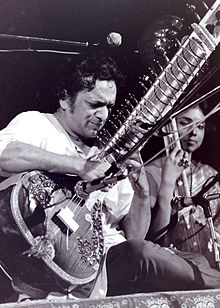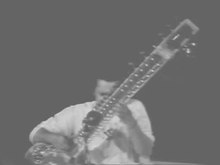Ravi Shankar
![]()
This article is about the sitar player and composer Ravi Shankar. For other namesakes, see Ravi Shankar (disambiguation).
Ravi Shankar (Bengali রবি শংকর Rabi Śaṃkar; * 7 April 1920 in Varanasi; † 11 December 2012 in San Diego; civil name Robindro Shaunkor Chowdhury) was an Indian musician and composer who played the plucked instrument sitar.
Shankar spent his youth touring Europe and India in his brother Uday Shankar's dance troupe. In 1938, he gave up dancing to learn to play the sitar under court musician Allauddin Khan. After completing his apprenticeship in 1944, Shankar worked as a composer, writing the music for Satyajit Ray's Apu trilogy, and was employed as music director of All India Radio New Delhi from 1949 to 1956.
In 1956, he began touring Europe and America in concert, and increased the reputation of Indian classical music there in the 1960s through teaching, performing, and exposure to violinist Yehudi Menuhin and George Harrison of the Beatles. Shankar explored Western music by writing instrumental concertos for sitar and orchestra, and toured worldwide in the 1970s and 1980s. From 1986 to 1992, he was an appointed member of the Rajya Sabha, the upper house of the Indian Parliament. Shankar was awarded India's highest civilian order, the Bharat Ratna, in 1999 and was the recipient of four Grammy Awards. He continued to perform throughout the 2000s, often with his daughter Anoushka. Hans Neuhoff called Shankar the most famous contemporary Indian musician in Die Musik in Geschichte und Gegenwart (2006).

Ravi Shankar (1969)
Youth
Shankar was born in Varanasi in 1920 into a wealthy and conservative Brahmin family of Bengal, the youngest of seven brothers. Shankar's Bengali birth name was Rabindra Shankar Chowdhury. His father, Shyam Shankar, was an administrator for the Maharaja of Jhalawar and used the Hindi spelling of the family name, from which he removed the last part. Shyam was married to Shankar's mother Hemangini Devi, but later practiced law in London. There he married a second time while Hemangini brought up Rabindra in Varanasi. He met his son only when he was eight years old. Shankar shortened the Hindi version of his given name, Ravindra, to Ravi, for "sun".
After spending his first decade of life in Varanasi, Shankar traveled to Paris with his brother Uday Shankar's dance group. By the age of 13, he was a member of the group, accompanying the other members on tours and learning to dance and play various Indian instruments. Uday's dance group toured Europe and America in the early to mid-1930s. In the process, Shankar learned French, discovered Western classical music, jazz, as well as cinema, and generally became acquainted with Western culture. Shankar heard the senior musician of the court of Maihar, Allauddin Khan, play at a music conference in Calcutta in December 1934. Uday convinced the Maharaja of Maihar in 1935 to allow Khan to accompany his group on a tour of Europe as a soloist. Shankar was taught sporadically by Khan during the tour, and Khan offered Shankar training as a professional musician on the condition that he give up all touring and come to Maihar.
Style and contributions
Shankar developed a style distinct from that of his contemporaries, incorporating influences from rhythmic practices of South Indian Carnatic music. His performances began with a solo in alap, jor and jhala (introduction and playing with pulse and fast pulse), influenced by the slow and serious dhrupad style, followed by a section with tabla accompaniment playing compositions from the predominant khyal style. Shankar often concluded his performances with a piece inspired by the light classical thumri style.
Shankar is considered one of the most important sitar players of the second half of the 20th century. He popularized playing on the bass octave of the sitar for the alap section, and became known for a style of playing with short rapid deflections of the strings in the middle and higher pitches, and his creation of sound by striking and pulling off the main playing string. Narayana Menon of the New Grove Dictionary noted Shankar's penchant for rhythmic experimentation, including the use of unconventional rhythmic cycles. Hans Neuhoff of Music in History and the Present argued that Shankar's style of playing was not widely adopted and that he was surpassed by other sitar players in playing melodic passages. Shankar's interplay with Alla Rakha increased the appreciation for tabla playing in North Indian classical music. Shankar promoted the jugalbandi duet concert form and introduced new ragas, including Tilak Shyam, Nat Bhairav and Bairagi.
Recognition
Shankar won the Silver Bear Special Award at the 1957 Berlin International Film Festival for composing the music of the film Kabuliwala. He was awarded the Sangeet Natak Akademi Prize for 1962 and was declared a Fellow of the Academy for 1975. Shankar received India's three highest civilian national honors: the Padma Bhushan in 1967, the Padma Vibhushan in 1981, and the Bharat Ratna in 1999. He was awarded the UNESCO International Music Council Music Prize in 1975 and received four Grammy Awards, of which the Lifetime Achievement Award was given to Shankar posthumously in 2013. Ravi Shankar has also been nominated for an Academy Award. Shankar has held honorary doctorates from universities in India and the United States. He received the Kalidas Samman from the Government of Madhya Pradesh for 1987-88, the Fukuoka Asian Culture Prize in 1991, the Ramon Magsaysay Prize in 1992, and the Polar Music Prize in 1998. Shankar was an honorary member of the American Academy of Arts and Letters since 1974 and received the Praemium Imperiale for Music from the Japan Art Association in 1997. American jazz saxophonist John Coltrane named his son Ravi Coltrane after Shankar.

Play media file Ravi Shankar in the 1970s at the Shiraz Art Festival in Iran.
Search within the encyclopedia